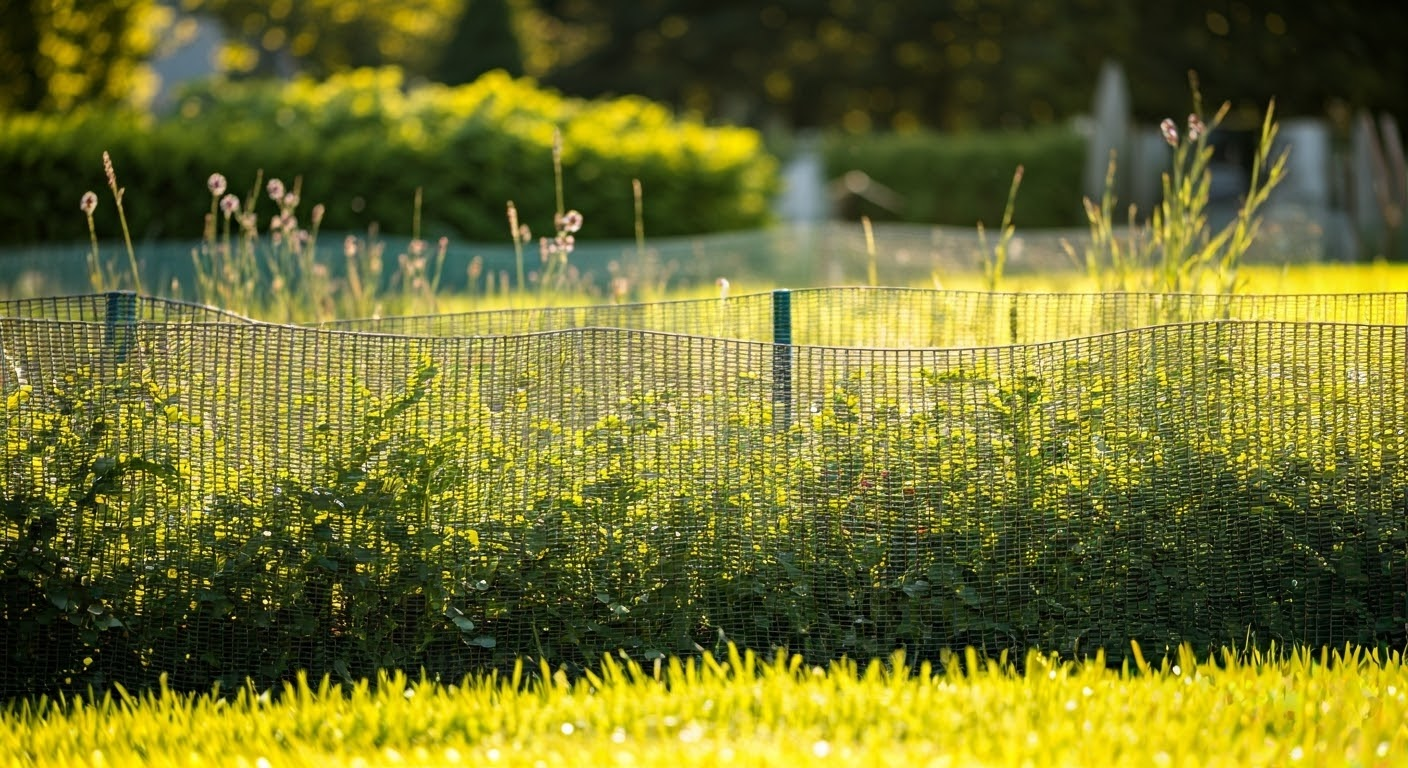Key Highlights
- Rabbits can seriously harm gardens and lawns by eating different plants and making holes.
- Natural and physical barriers can help keep rabbits out of your yard.
- Planting rabbit-repellent plants like onions and garlic alongside other plants can keep them safe.
- You can use homemade repellents and store-bought products for extra protection against rabbits.
- Keeping your yard tidy, with trimmed plants and short grass, makes it harder for rabbits to hide.
Protecting your vegetable garden from rabbits is like keeping your savings safe. You wouldn’t want to risk your hard-earned money. Similarly, you don’t want to make your plants an easy snack for these furry thieves. Think of rabbit-proofing your garden as creating good money habits through hard work for your plants. Even if it takes an embarrassing amount of time, it’s worth it. A well-protected garden will give you many rewards. Just like a high interest savings account can help you with the next rental application and improve your financial future!
Understanding Rabbit Behavior and Habits

To keep rabbits away, you should understand their behavior. Rabbits are usually active at dawn and dusk. During these times, they search for food. A female rabbit can have several litters every year.
Rabbits prefer areas where they can find food and shelter. They like yards with lots of plants, tall grass, and quiet places to hide from danger. If you know what they like, you can change your yard’s design and plants to make it less attractive for them.
Identifying Signs of Rabbit Presence in Your Yard
Before you try to get rid of the bunnies, you should check if they are really there. Luckily, rabbits leave some clear telltale signs. A big clue is their droppings. These are small, round pellets, like peas, that you can find all over your yard. You will often see them near where the rabbits eat.
Another sign to watch for is damage to your plants. Rabbits really love tender shoots and leafy greens. If you notice neat, nibbled edges on your plants, bunnies might be responsible. If your plants seem to disappear overnight, it could be because of rabbits. Also, check for burrows. These are small holes in the ground, often found near fences or under shrubs.
What Attracts Rabbits to Your Yard?
From a rabbit’s view, your yard seems like a huge buffet! The wide open spaces on your lawn are perfect for eating, so the grass is tough for rabbits to ignore. Your vegetable garden, full of leafy greens like delicious lettuce and tasty spinach, looks like a fancy restaurant to them. It’s even better knowing that rabbit poop can help the plants grow.
The flower beds with bright flowers are like a treat for rabbits. They love plants that have sweet nectar or fragrant petals. If you want to keep them away, you can make some changes to your yard based on what they like to eat.
Natural and Safe Methods to Deter Rabbits

You can keep rabbits away without using harmful chemicals or complicated traps. There are many natural and safe ways to do this. These methods help make your yard unappealing to rabbits or create barriers that they will not cross.
By using several strategies together, you can create a strong defense for your yard. This will help you keep your space safe without harming these playful animals.
The Role of Companion Planting to Repel Rabbits
Companion planting means putting certain plants next to each other to help them grow. This practice can also keep rabbits away. Some plants release a strong smell that rabbits dislike. Because of this, rabbits tend to stay away and not come too close.
Onions and garlic can help keep rabbits away. Good news: their strong scent, often called a pungent smell, can protect other plants nearby. By planting these strong-scented plants around the perimeter of the garden or near special plants in open spaces, you can greatly reduce the risk of damage from rabbits.
Homemade Rabbit Repellents That Work
If companion planting is not enough, you can try using homemade rabbit repellents for more protection. These simple solutions have strong smells that rabbits do not like.
Here are some effective homemade repellents:
- Red pepper spray: Combine one tablespoon of red pepper flakes or chili powder with water. Spray this around your garden to keep rabbits away.
- Garlic and onion spray: Blend several garlic cloves with chopped onions and water. Strain the mixture and spray it around your plants.
- Vinegar solution: The strong smell and acid in vinegar help to keep rabbits away. Mix equal amounts of water and white vinegar in a spray bottle.
- Remember to use these homemade repellents again and again.
- This is important, especially after it rains.
- Doing this will help keep them working well.
Physical Barriers and Modifications for Rabbit Prevention
Natural deterrents can be helpful. But sometimes, you need something stronger. That’s when you can use physical barriers, like fences around your individual plants. This is similar to finding free money by keeping your investments safe. Treat your yard like a safe fortress. A huge financial nerd would look at it like managing a budget. A few smart changes can help you keep furry pests away.
The best and most reliable way is to put up a fence. Choose a fence that rabbits cannot jump over or dig under easily. It is also good to take care of your yard. Basic maintenance can help keep rabbits from making your yard their home.
Choosing the Right Fencing to Keep Rabbits Out
Chicken wire has tiny holes. It works well to keep rabbits away. You need to install it correctly for the best results. The fence should be at least 2 feet tall. Rabbits can jump higher than you might expect. To prevent them from squeezing through small spaces, bury the bottom of the fence at least 6 inches deep. You can also add an L-shaped footer for extra protection.
You can use hardware cloth. It has smaller openings, which help keep out unwanted animals better. While it is pricier than chicken wire, it lasts longer and is harder to chew through. Whatever you choose, remember to check your fence often for damage. Fix any holes or loose parts quickly. A strong perimeter of the garden is very important to keep rabbits away.
Importance of Regular Yard Maintenance in Rabbit Control
Keeping your yard clean is important. A tidy yard looks nice, but it also helps keep rabbits away. This can prevent any major upset related to a type of loan or credit card for your landscaping investment. When you remove places for them to hide and find food, your yard will feel less welcoming to rabbits. Regular lawn care is key for this. Mow your grass often and keep it short, ideally under 3 inches. If the grass is tall, it gives rabbits a place to feel safe.
- Trim any bushes or shrubs that are too big. This makes it harder for rabbits to build nests there.
- It’s also good to pick up any fallen fruits, vegetables, or nuts. This helps to remove easy food and makes rabbits search for food elsewhere.
- Remember to check your flower beds often.
- Remove piles of leaves or debris. This could give rabbits a nice hiding spot.
Conclusion
To keep rabbits out of your yard and protect the parts of the garden, you need to know how they behave. You can use natural deterrents along with physical barriers, like commercial rabbit repellents. Look for signs that rabbits are around. Find out what attracts them and consider methods such as companion planting and homemade repellents. Doing this can help keep your yard safe. Regular yard care and good fencing are also important. Use these steps to keep rabbits away from your garden. If rabbits still return, ask experts for good luck advice on how to protect your yard.
Frequently Asked Questions
What Are the Most Effective Natural Repellents for Rabbits?
Some good, natural rabbit repellents and home remedies include red pepper flakes, hot peppers, predator urine (make sure it comes from ethical sources), Irish Spring soap, and human hair. You might think moth balls can help, but they are toxic. So, you should avoid using them.

Hi, I’m Sondip,
I’m a writer who loves to help people solve their problems. I write about small animals like mice and other small animals and even pests.

